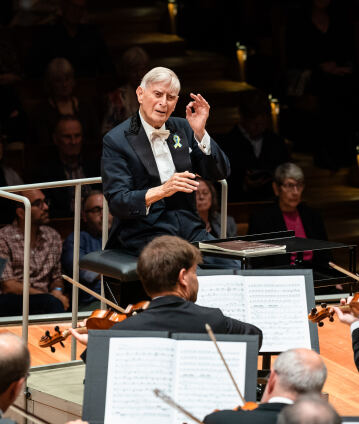Herbert Blomstedt conducts Beethoven’s “Eroica”

Contrasting expressive worlds: the inward-looking Metamorphosen, in which the 81-year-old Richard Strauss mourns the destruction of the Second World War, and the forward-charging Eroica of the young Beethoven. A motif from the funeral march of the Eroica, which Strauss quotes, establishes a connection. The wisdom of old age and esprit – Herbert Blomstedt combines them in his charismatic personality.
The Berliner Philharmoniker and Herbert Blomstedt continue their journey together through the symphonies of the 19th century with the Eroica. With a playing time of over 50 minutes, Ludwig van Beethoven’s Third Symphony is significantly longer than his first two and every symphony by Haydn and Mozart. The composer also prescribes a significantly larger orchestra. Beethoven also introduced new aspects to the genre by composing the finale as a series of variations and placing a funeral march in place of the slow movement. It is primarily due to this movement that the work derives its heroic character.
Beethoven withdrew the originally planned title Buonaparte in favour of the now familiar epithet. His view of Napoleon was ambivalent: sympathy for the liberal ideals of France conflicted with the patriotism of the adopted Austrian. During the so-called Coalition Wars, the countries were enemies.
Richard Strauss wrote his Metamorphosen at the end of the Second World War. With this work, the composer responded to, among other things, the destruction of the opera house in Munich, where he had enjoyed some of his greatest successes. Whether Strauss, who had assumed the presidency of the Reich Chamber of Music in 1933, also reflected his own behaviour during National Socialist rule in the work is not known. Any remarks he made after the end of the war were devoid of self-criticism. But the tone of his mourning is sincere and poignant.
The intimate Metamorphosen, largely in chamber music style, end with the theme of the Eroica funeral march. According to the composer, this originally unplanned quotation – as the final “transformation” of his own themes – came about virtually of its own accord, demonstrating how familiar Strauss was in the musical tradition to which he bade farewell in his last works.
© 2023 Berlin Phil Media GmbH
Related interviews
Artists
Our recommendations
- Herbert Blomstedt conducts Dvořák and Berwald
- Herbert Blomstedt conducts Schubert and Beethoven
- Herbert Blomstedt conducts the “Symphonie fantastique”
- Herbert Blomstedt conducts Beethoven’s “Missa solemnis”
- Herbert Blomstedt conducts Bruckner’s Eighth Symphony
- Bartók and Brahms with Herbert Blomstedt and András Schiff